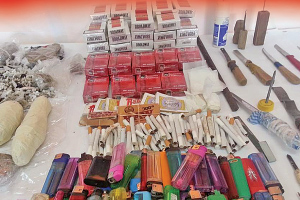(Trinidad Express) There is a big business behind bars in prisons where a hot seller is cigarettes at TT$600 a pack.
According to a senior prison official, business is booming with over 500 cellphones confiscated in just one month. Some 300 were destroyed yesterday alone.
On Wednesday, some 150 prison officers who conducted a sweep of the Maximum Security Prison in Arouca from 11 a.m. to 7 p.m. seized a number of knives, shanks, and L-shaped metal objects which were hidden in cells.
The Special Prisons committee headed by Prof Ramesh Deosaran which was appointed by Prime Minister Kamla Persad-Bissessar visited the Maximum Security and Golden Grove prisons in Arouca yesterday where these items as well as contraband that was seized over the past month were laid out on a long table for viewing.
Over a hundred cellphones, dozens of boxes of cigarettes and loose cigarettes, marijuana, knives, razor blades, lighters and even mosquito sprays were on display.
The prison official told the Express some “unscrupulous” prison officers make a mint in smuggling illegal items into the jails for prisoners.
The officer said there is actually a price list for stuff on sale.

A cellphone can be sold for as little as $100 to $600.
A small piece of marijuana, less than one centimetre in size, goes for TT$20 a piece.
Even a plate of food has a price.
Asked how the cellphones are smuggled into the prisons, the officer explained that small phones such as Alcatel and Samsung are wrapped in plastic, greased with Vaseline and inserted into the body cavity thereby passing through metal detectors.
Cellphones are “topped up” from outside as the calling card codes are texted to the prisoners or funds transfers are sent from phone to phone.
The officer said prisoners smuggle items from the YTEPP workshops where they are given the opportunity to learn a trade.
All these items are also sold.
Prisoners, said the officer, use these metal objects to jam the electronic bars of the cell and attack prison officers.
“Everything has a price, as a matter of fact inmate even sell their food at times,” said the officer.
Asked whether there was any resistance from the prisoners when the raids of the cells were being conducted, the officer replied, “We try to be as professional as we can, we inform them what we are here to do, we had about 150 officers so with that amount there was no resistance, we allow them to stand and watch as we searched the cells.”
Questioned on what was being done to weed out the rogue officers who facilitate the illegal trading in the prisons, the officer said some eight officers were singled out and handed over to the police this year and some were suspended when drugs were found on them.
The officer said ridding the jails of illegal items is a challenge.
“We have them (officers/prisoners) pass through scanners yet they find a way to break and beat the system, it really is an uphill task but we remain relentless,” said the officer.
The officer said prisoners somehow even manage to get their hands on insect sprays which officers use in the prisons as there is a mosquito problem and they create fire bombs with the use of lighters.
According to the officer, on one occasion a prisoner used the spray to create a fire and in the midst of the smoke knocked a prison officer on his head.
The officer said the country was in dire need of a new prison and a total revamp of the criminal justice system.
The officer said further that there was need for new machinery such as body scanners and cellphone jammers.
The Port of Spain prison, noted the officer, was “very porous” as relatives of prisoners throw bags of marijuana and other items over the prison walls and then call them and direct them where to search.
“Sometimes at 4 a.m. we have officers searching and you will be amazed at how many packets (marijuana) we get,” said the officer.
This problem remains a challenge even with the implementation of CCTV cameras.
“When you have a prison in the middle of the city you are asking for trouble. Look at the trends across the world. You would not find a prison in the heart of a city,” said the officer.
The officer said there was a plan years ago to construct a prison in St Madeleine and this needs to be revisited.
The Golden Grove prison was designed to be a holding camp for Canadian officers in this country while Remand Yard was originally carded for a cinema, he said.
The officer pointed out that in foreign jurisdictions there are separate dormitories for prison officers where they leave their bags and are properly scanned before entering the prisons.
The overcrowding of the nation’s prisons, said the officer, was another pressing issues.
The officer said that rehabilitation measures should be implemented.
“When you charge someone for possession of a device and send them to prison, that may not be the best place for them, there must be a rehabilitation system, putting someone in jail does not solve a drug problem,” said the officer.
“There is need for improvement of the criminal justice system where cases can be heard faster, police should have more vehicles to take the inmates to the courts rather than take some at a time,” the officer added.
The officer said that there are high expectations that the committee would put measures in place to improve the prison system.
Apart from Deosaran who chairs the committee, other members of the committee are Commissioner of Prisons Martin Martinez, Inspector of Prisons Daniel Khan, National Security Minister Gary Griffith, Justice Minister Emmanuel George, acting Commissioner of Police Stephen Williams, attorney Wayne Sturge and general secretary of the Prisons Officers’ Association, Gerard Gordon.





